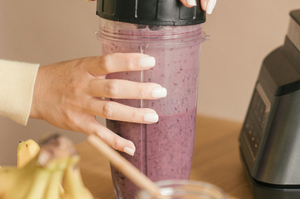
Expert tips for improving gut health
You may have heard that your gut health plays a huge role in your overall wellbeing, affecting everything from your digestion and immune system to your mental health. But what actually is gut health, and what can you do about it?
Your gut microbiome is a complex community of trillions of micro-organisms living in your digestive tract, and its 'health' is affected by many different things - some within your control and some outside of it. This article dives into the gut microbiome's importance and why it varies among individuals, offering expert tips to improve and maintain a healthy gut.
About your microbiome
Your gut microbiome is made up of bacteria, viruses, fungi and other micro-organisms. These tiny organisms help break down food and produce essential nutrients for your body. 1 If you have a healthy and balanced microbiome it will aid better digestion and improved nutrient absorption, as the 'good' bacteria break down complex carbs, make vitamins B and K, and keep the gut lining healthy. 2
Your microbiome is unique to you and is affected by many different things from the moment you're born. Even factors such as how you were born (vaginal vs. caesarean) and whether you were breast-fed can shape your microbiome.3 Your diet, environment and lifestyle also play a massive part - and fortunately, these are things that you can modify.
So, why is your microbiome important?
There's increasing evidence that your gut health affects many different systems in your body, with mental health being one. The bacteria in your gut produce neurotransmitters such as serotonin, which impact your mood and cognition 4 , so a balanced microbiome can boost mental health. 5
But it's not only your mental health that's affected. In addition, an imbalanced diet and microbiome can impair nutrient absorption, leading to deficiencies that affect your overall health. 5
Improving your gut health with your diet
Enough about the effects of the microbiome. How can we improve it?
Fibre is essential for gut health - you can find it in fruits, vegetables, legumes and whole grains. It acts as food for the 'good' gut bacteria and promotes a diverse and balanced microbiome. 6 The more diverse in plants your diet, the better. Live bacteria are also good for your gut - they're found in supplements as well as fermented foods such as yoghurt, kefir, sauerkraut and kimchi. They help to introduce and maintain a healthy population of gut bacteria 7 , and can be particularly useful after antibiotic use or digestive issues. 8
So, focusing on a diverse, whole-food, vegetable-rich diet with additional live bacteria is a great place to start when shifting to a more gut-friendly diet.
Another tip is ensuring you're well hydrated. Water is crucial for digestion and overall gut health as it helps to break down food, aid nutrient absorption and keeps the digestive tract moving smoothly. Most people should be aiming to drink at least eight glasses of water a day. 10 [EK6]
As well as this, try to limit processed foods, excessive sugar and artificial sweeteners, as these can disrupt the gut microbiome and promote the growth of harmful bacteria, leading to an imbalance. 11 Also, be mindful of any personal food intolerances and avoid foods that cause you digestive discomfort.
Lifestyle changes to improve your gut health
Unfortunately there's no quick fix when it comes to having a healthy lifestyle, but there are lots of small changes you can make to improve your overall wellbeing.
One thing to focus on is your stress levels. Chronic stress harms more than just your mental health. It can also harm your gut health by altering gut bacteria, increasing inflammation and causing a flare of uncomfortable GI symptoms. Finding ways to manage stress is personal and different for everybody, but some methods to try include mindfulness and meditation, yoga and regular physical exercise.
Exercise is not only good for your stress levels, but studies have also shown that regular exercise is likely to increase the diversity of your gut bacteria. 12 You should aim for at least 30 minutes of moderate exercise on most days of the week.
Quality sleep not only helps maintain good mental health, energy levels and feelings of wellbeing, but it is also (unsurprisingly) vital for gut health. Poor sleep can disrupt the gut microbiome and cause gastrointestinal issues and unpleasant symptoms. 13 Aiming for seven to nine hours of sleep per night is ideal. If you're struggling with sleep, having a regular sleep schedule and good sleep hygiene can help.
Quitting smoking and reducing your alcohol consumption are other lifestyle changes you can make that can positively impact your gut health and your overall wellbeing.
Finally, antibiotics can disrupt the gut microbiome by killing both harmful and beneficial bacteria, 14 [EK10] so make sure you follow any advice from your doctor when they're prescribed.
Supplementation and gut health
As we touched on earlier, fibre found in foods such as vegetables, legumes and fruits supports the growth of beneficial bacteria, and live bacteria can be introduced into your gut from supplements or fermented foods. While live bacteria supplements aren't the mainstay of a healthy gut, there's some evidence that they help to replenish and maintain a healthy microbiome, especially after illness or treatment. 15
When considering starting a supplement you should consult with a healthcare professional, especially if you have underlying health conditions or are taking other medications. When choosing a supplement, look for high-quality supplements from reputable brands, and when choosing live bacteria supplements, pick one with multiple strains and a high colony-forming unit (CFU) count.
How to monitor and maintain your gut health
If you're worried about your gut or gut health in any way, always contact your doctor for further investigation.
So, now what?
Now you know that gut health is crucial for overall wellness, impacting digestion, the immune system and mental health. By understanding your gut microbiome and implementing dietary and lifestyle changes, you can significantly improve your gut and overall health.
Incorporate these expert tips into your daily routine, and experience the benefits of a balanced gut microbiome. Your body will thank you!
- [How Can I Improve My Gut Health? – BHF]( https://www.bhf.org.uk/informationsupport/heart-matters-magazine/nutrition/how-can-i-improve-my-gut-health )
- [Harvard Health – The truth about vitamins and minerals]( The Truth About Vitamins and Minerals: Harvard Health Publications (editor): 9781614010142: Blackwell’s (blackwells.co.uk) )
- [NCBI – The Infant Microbiome development: Mom matters https://www.ncbi.nlm.nih.gov/pmc/articles/PMC4464665/ ]
- [Bladder & Bowel – The Link between your belly and brain](https://www.bladderandbowel.org/news/belly-and-brain/)
- [PubMed – Gut microbiome-micronutrient interaction: The key to controlling the bioavailability of minerals and vitamins] (https://www.ncbi.nlm.nih.gov/pmc/articles/PMC9311823/)
- [Harvard Health Publishing – Diet, disease, and the microbiome ( https://www.health.harvard.edu/blog/diet-disease-and-the-microbiome-2021042122400#:~:text=The%20study%20found%20that%20the,groups%2C%20and%20overall%20diet%20composition )
- [PubMed – Probiotics in the Management of Irritable Bowel Syndrome]( https://pubmed.ncbi.nlm.nih.gov/37565634/ )
- [NHS – Probiotics] https://www.nhs.uk/conditions/probiotics/#:~:text=Probiotics%20are%20thought%20to%20help,irritable%20bowel%20syndrome%20(IBS)
- [Harvard Health – How much water should I drink?]( How much water should I drink a day? – Harvard Health
- [PubMed: Gut Microbiota: An important Link between Western Diet and Chronic Diseases](https://www.ncbi.nlm.nih.gov/pmc/articles/PMC6835660/)
- [NCBI – Physical Activity and Gut Microbiota Composition]( The Effect of Exercise Prescription on the Human Gut Microbiota and Comparison between Clinical and Apparently Healthy Populations: A Systematic Review – PMC (nih.gov) )
- [PubMed – Sleep, Circadian Rhythms, and the Gut Microbiome]( Sleep, circadian rhythm, and gut microbiota – PubMed (nih.gov) )
- [UCLA Health – Antibiotics can temporarily wipe out the gut microbiome] https://www.uclahealth.org/news/article/antibiotics-can-temporarily-wipe-out-gut-microbiome#:~:text=It%20has%20been%20found%20that,unique%20to%20each%20person%27s%20microbiome









